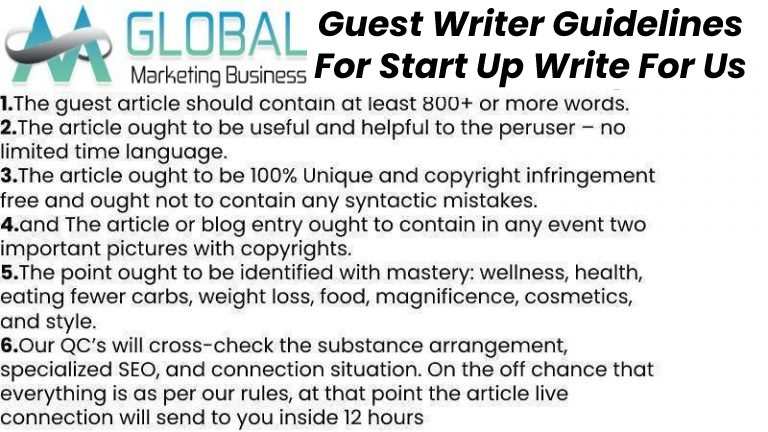What is a Start-Up?
 Start-Up Write For Us – The term start-up refers to a business in its early stages of operation. Start-Ups are founded by entrepreneurs who want to develop a product or service they believe is in demand. These companies often start with high costs and limited revenues, seeking capital from various sources, such as venture capitalists.
Start-Up Write For Us – The term start-up refers to a business in its early stages of operation. Start-Ups are founded by entrepreneurs who want to develop a product or service they believe is in demand. These companies often start with high costs and limited revenues, seeking capital from various sources, such as venture capitalists.
Advantages and Disadvantages of Start-Up
Working in a Start-Up has several advantages. More responsibility and opportunities to learn – two. Since Start-Ups have fewer employees than large, established companies, employees tend to wear many hats while working in different roles, increasing responsibility and learning opportunities.
Start-Ups tend to be more laid back, making for a more collaborative workplace with flexible hours, increased employee interaction, and flexibility. Start-Ups also tend to have better workplace benefits, like childcare, free meals, and shorter workweeks.
Working in Start-Ups can also be more rewarding, as innovation is encouraged and managers allow talented employees to work on ideas without much supervision.
Advantages
More learning opportunities
greater responsibility
Flexibility
Workplace Benefits
Innovation is encouraged
Flexible schedule
Less
risk of failure
Need to raise capital
high stress
competitive business environment
Start-Up Examples
Dotcoms were a typical Start-Up in the 1990s. Venture capital was straightforward due to the frenzy of investors willing to speculate on these Start-Ups. Unfortunately, most Internet Start-Ups went bankrupt due to severe shortcomings in their business plans, such as not having a sustainable revenue path. However, a minority of companies survived when the dotcom bubble burst. Amazon (AMZN) and eBay (EBAY) are just two examples.
Many Start-Ups fail in the first few years, so this initial period is critical. Entrepreneurs must raise money, create a business model and plan, hire key personnel, work out intricate details such as equity stakes for partners and investors, and develop a long-term strategy. Many of today’s most successful companies—Microsoft (MSFT), Apple (AAPL), and Meta (FB), formerly Facebook, and many others—started as Start-Ups and ended up as public companies.
How to Create a Start-Up Company?
The 1st step in starting a Start-Up is a great idea. After that, market research is the next step to determine the picture’s feasibility and current market. The next step after market research is to create a business plan that outlines your company’s structure, goals, mission, values, and objectives.
The most crucial step is to get financing. It can be savings, friends, family, investors or a loan. After raising funds, make sure you complete all the necessary legal and administrative paperwork. It means registering your business and obtaining any required licenses or permits. After that, locate the company. Create an advertising plan to attract customers, build a customer base, and adapt as your business grows.
To write for us, you can email us at contact@globalmarketingbusiness.com
Guest Writer Guidelines
 Choose Topics – Before requesting an article submission, browse our articles and come up with three unique content ideas that you like best by writing an amazing, well-researched, and detailed Article.
Choose Topics – Before requesting an article submission, browse our articles and come up with three unique content ideas that you like best by writing an amazing, well-researched, and detailed Article.
Topic Selection: After you submit an article submission, we’ll select a topic from your suggestions and invite you to write.
We prefer to submit submissions as Google Docs to provide feedback and recommendations on the draft quickly.
Word limit. We only accept articles with at least 500 words.
Subheading Format: Provide correct headings and H1 and H2 tags.
Add Links – Add 1-2 external links.
Plag Free: 100% plagiarism-free (100% unique content)
Author: You can also include a personal photo and a short biography of the author.
Content outline: Summarize the content and provide a good summary of it.
Approval Time: This is a sponsored post. The best offer will be approved and emailed to you within 1-2 business days.
Correction: After the Article’s publication, we do not allow modifications; we can make changes if necessary.
Although, We will publish your Article within a week and send you a link via email if all goes well.
This is What we are Looking for in the Article:
Creativity
Although, we do not publish content that has already been posted somewhere. Also, Google doesn’t like duplicate content, and we don’t like being your second choice either.
I complete it
We are looking for well researched and detailed articles of at least 1500 words. The best pieces tend to be 2,000 words, and we want more of them.
Practical Tips
We need practical advice and conclusions that our readers can apply. Use theory, research, and science to back up your claims and complete your Article. Always include links to reputable sources that support what you say.
Real-Life Examples
Share your knowledge and use illustrations to help a person who understands the topic better. Although, In most cases, your expertise and unique point of view will add the most value to your Article.
Special Note About Links
Links are essential for articles, and we would be grateful if you could use them when you’re making a statement, citing research, using data in your story, wanting to give readers more context, etc., source. Bonus point if you find an article on the Start-Up blog on a similar topic.
You can also add a single link to a blog post and other informative content on your page, as long as it fits well with the position and is of value to the reader. Advertising links out of context and product and service offers are not allowed and removed.
What do we not Publish?
Too Many Ads
If you want to write for us, always remember that guest posting is a way to showcase your knowledge and experience to your readers. They are not a platform for excessive promotion of services, offers or companies. Remember that our readers come looking for success stories, tips, and advice on starting and running a successful Start-Up.
Content Already Published
We do not publish articles that have already been published on our site, and you even made some changes to it. Although, We only accept unique and original.
Copied Content
We do not accept copied/ plagiarized content on our website. And this is a severe violation of our policy, which can lead to permanent deactivation and blocking your account.
Confusing Information
You must not include false information or data in your content. You must give the proper citations and credits and cite the source of the Article’s information. Always try to use reliable information from reputable websites or sources and give credit accordingly.
Use of Photos/Images
You should not add any pictures or images to your content before submitting it because we do not allow it due to copyright issues, and if necessary, we will add them on our side.
Separate Profiles
Although, We do not accept individual profiles of any Start-Up founders until they are well known.
Conclusion
Start-up a business can be a challenging but rewarding task. Coming up with a great idea and bringing it to market comes with many challenges, such as raising capital, employees, marketing, legal work, Investment Planning and financial management. However, keep in mind that new ventures increase job satisfaction and legacy.







